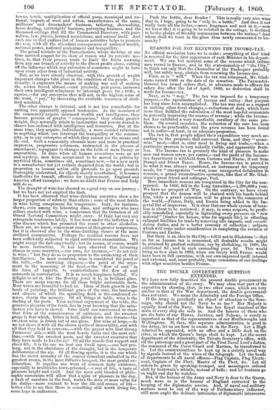REASONS FOR NOT RENEWING THE INCOME-TAX.
No official revelation have we to make ; everything of that kind
i
is reserved for the first appearance of each Minister n his depart- ment. We can but marshal some of the reasons which induce men versed in finance, and in the statesmanship of "the City," to think not only that the Chancellor of the Exchequer probably will, but safely may, abstain from renewing the Income-tax. First, as to When the tax was reimposed, Mr. Glad- stone named 1860 as the date of its cessation. The Paymaster- General has issued orders that, in advances made to officers for salary due after the 1st of April, 1860, no deduction shall be made for Income-tax.
Next, as to "may." The tax was imposed for a temporary purpose,—the equalization of income and outlay: that purpose has long since been accomplished. The tax was used as a support in making other fiscal changes,—reductions.of duty, which have more than fulfilled the calculation of the most hopeful economists in generally improving the sources of revenue ; while the Income- tax has exhibited a very remarkable corollary of the same pro- blem. On several occasions, the reduction of the rate has been shown to be practicable, and the gross revenue has been found not to suffer—at least, in no adequate proportion. The fact is, that people adjust their expenditure very much ac- cording to the pressures that surround them, and they " econo- mize " most,—that is, stint most in living and trade,—when a particular pressure is very nakedly visible, and apparently fruit- less. The Income-tax is precisely the kind of pressure to make men and women screw, per contra,—and the profit of the Income- tax department is withheld from Customs and Excise, if not from Stamps and Direct Taxes. Hence, the Income-tax is proved to be what it was always considered, an instrument for temporary needs, for "emergencies "—war, some unexpected defalcation in revenue, a grand reconstructive operation, like that of Mr. Glad- stone's great friend and colleague, Peel.
More immediate reasons are recognized in the City for the non- renewal. In 1860, fall in the Long Annuities —1,200,000 a year. We have no prospect of War. On the contrary, we have every prospect that the demon will be chained with his hands behind him, while a grand extension will be given to the commerce of the world,—France, Italy-, and Russia being added to the Im- perial list of improvers. It is clear that our whole system of taxa- tion is about to be reviewed ; it may, in some respects, be profit- ably remodelled, especially in lightening every pressure on raw material" [timber for houses, wine for organic: life], in affording enlarged facilities for trade by removing idle imposts, and consoh- dating duties, and in a better economy of collection ; subjects which will come under consideration in completing the revision of Customs and Excise.
But there is an idea in the City—tell it not to Gladstone1—that so far as Income tax is concerned, all desirable results might be attained by gradual reduction, say by abolishing, in 1860, the additional 4d., and in each succeeding year, 3d. This would bring us to a close in 1863, when our treaty with France would have been in full operation, with our own improved tariff, internal and external, and, most probably, large extensions of our dealings with otlier countries besides France.


























 Previous page
Previous page